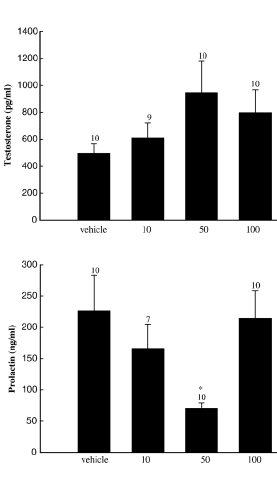|
Definition: "An ergogenic aid is any substance or phenomenon that enhances performance "
|
|
||||||||
17.08.2008 |
|
|
Animal study: ginkgo is prolactin inhibitor
The Taiwanese tested male rats, which were given ginkgo daily for four weeks. The researchers used four groups of animals, which were administered zero, 10, 50 or 100 mg of ginkgo per kg body weight per day. During the month the researchers put the male rats together with female rats and recorded the number of times they had sex. The figure on the right shows the number of times the rats had sex during the last day of the test.
Because the researchers wanted to know how ginkgo stimulates the sexual behaviour of rats, they measured the testosterone and prolactin levels. The effect was most clear in the group of animals that had received 50 mg per kg body weight a day.

In high concentrations, prolactin inhibits the production of testosterone. But even when prolactin levels are too low to reduce the production of testosterone, prolactin can still reduce the sex drive. When the researchers examined the brains of the rats in the 50 mg group, they discovered higher concentrations of dopamine and its metabolite 3,4-dihydroxyphenylacetic acid.
The Taiwanese researchers think that this is why ginkgo acts as a prolactin inhibitor. They also tested whether ginkgo influences the production of testosterone in the testes directly, but the results were inconclusive.
Source:
|
|

